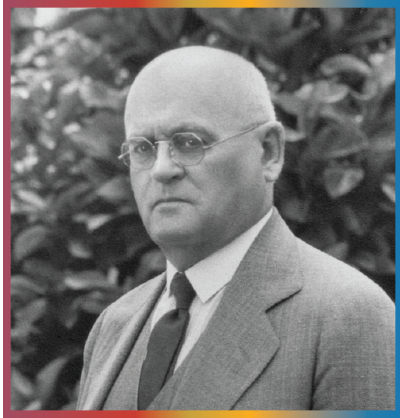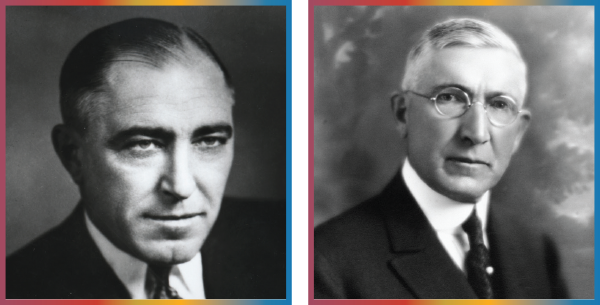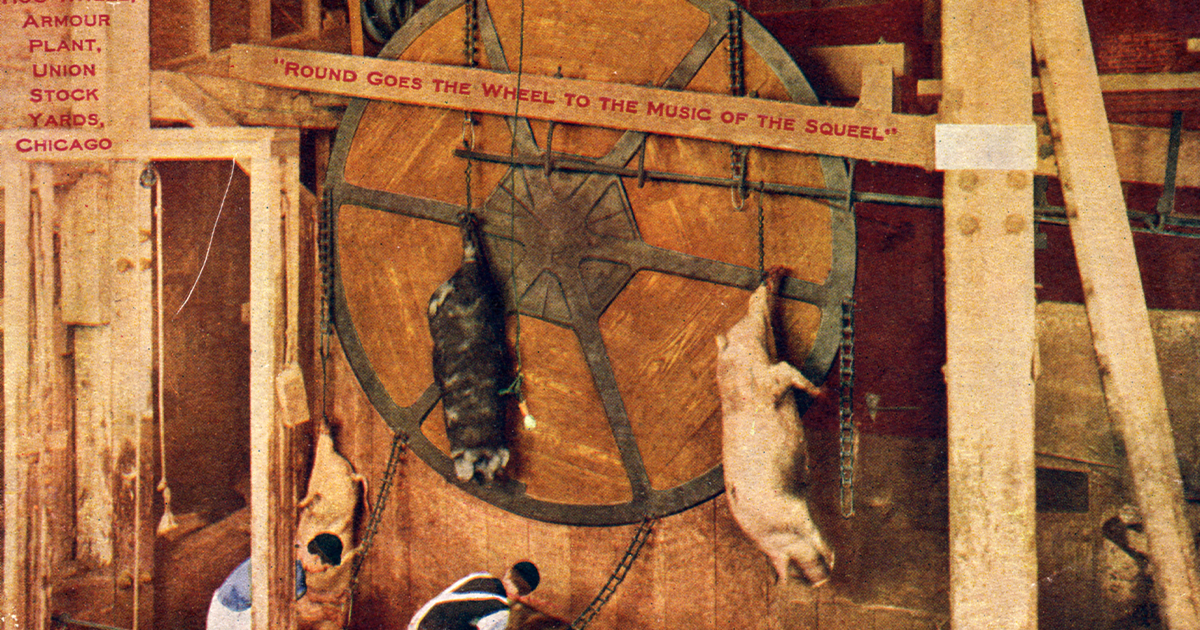By Monica Watrous
August 17, 2021
Setting the
table
The enduring legacies of George Hormel, W.K. Kellogg and Milton Hershey


W.K. Kellogg, Milton S. Hershey and George A. Hormel were among the visionary entrepreneurs who more than a century ago paved the way for how the world eats today.
The founding fathers of the packaged food industry demonstrated ingenuity and resilience in the face of failed businesses and factory fires, worker strikes and world wars, a global pandemic and the Great Depression.
Today, the companies that bear their names honor the founders’ legacies while elevating a new generation of food entrepreneurs to ensure the next century of success.
A cereal entrepreneur
By the late 1800s, former broom salesman William Keith Kellogg had joined his older brother, renowned physician Dr. John Harvey Kellogg, to run a health spa in Battle Creek, Mich. The younger Kellogg handled bookkeeping and other responsibilities at the Battle Creek Sanitarium, where patients ate a vegetarian diet that included an early form of unsweetened granola based on wheat and oats. (A guest there named Charles W. Post was accused of swiping the recipe that would inspire the launch of Grape Nuts cereal).
An experiment with the grain mash led to the accidental invention of flaked cereal. The discovery would lead to a bitter brother rivalry, including a legal dispute over naming rights, but more significantly, it would revolutionize the traditionally meat-based morning meal.
Soon after W.K. Kellogg founded his boxed cereal business in 1906, dozens of competitors flocked to Battle Creek, eager to capitalize on this new convenient and wholesome breakfast concept. Mr. Kellogg distinguished his offering by adding his signature to each package of Kellogg’s Corn Flakes. A savvy businessman, Mr. Kellogg continually improved the product line, packaging technology and marketing strategy to meet changing consumer tastes. He later established the W.K. Kellogg Foundation to promote the health and well-being of children.
“W.K. Kellogg was an early conservationist, a leading philanthropist and the original well-being visionary,” said Kris Bahner, spokesperson for Kellogg Co. “His values live on today through our K Values — they shape our Kellogg culture and guide the way we run our business. They help to define what makes our company and our people special and how we all play a unique and critical part of the ongoing success of our business.”
Today, Kellogg Co. invests in emerging businesses with innovative product concepts through its venture fund, eighteen94 capital. Kellogg also is a founding sponsor of The Hatchery, a food business incubator in Chicago. The company supports creativity at all levels of the organization through innovation competitions, including one held recently for its interns.
“That innovative and entrepreneurial spirit that shaped an entire industry lives on today — we like to say innovation breathes fire into our vision and purpose as a company, and we continue to innovate as we head into the next 115 years,” Ms. Bahner said.

A chocolate empire
Prior to popularizing milk chocolate in America, Milton S. Hershey encountered a series of setbacks. His first two businesses had failed. Perfecting the formulation for his signature product followed months of trial and error. Driven by persistence and vision, Mr. Hershey developed a new process for creating chocolate, tapping local dairy farms for fresh milk, and ultimately transforming an elite treat into an everyday staple for the masses.
“We steward Mr. Hershey’s legacy of innovation and entrepreneurship by seeking to add more beloved snacking brands to our portfolio,” said Ryan O’Hara, director of strategy at The Hershey Co. “We continually scan the market for high-growth, high-potential brands like Skinny Pop, and more recently Lily’s, to extend our moments of goodness with new consumers and new occasions.
“We also invest in startup companies like Blue Stripe and Quinn that are uniquely innovating in snacking, and related capabilities like Bonumose, that are developing breakthrough technologies to meet current and future consumer needs.”
Mr. Hershey’s achievements extend beyond the company and surrounding community he built in his name. He was a celebrated philanthropist who notably coined the term “commerce with compassion,” viewing business as a force for good. In 1909, he and his wife, Catherine, founded what would become the Milton Hershey School to provide education and opportunity for orphaned boys. He later transferred the majority of his wealth to the Milton Hershey School Trust fund. In 1935, he established the M.S. Hershey Foundation, a non-profit dedicated to cultural and educational enrichment.
“Purpose-driven companies are now becoming more commonplace, but Milton Hershey started it all over 100 years ago when it wasn’t even popular or on anyone’s radar,” said Brian Lange, a Hershey plant manager.

A protein pioneer
“Originate, don’t imitate,” a key commandment of George A. Hormel’s business, guides innovation efforts today. The challenge is imprinted on a wall of the Hormel Foods Corp. headquarters in Austin, Minn.
With previous meatpacking experience, Mr. Hormel established Geo. A. Hormel & Co. in 1891, setting up pork processing operations inside an abandoned creamery. He also opened the Hormel Provision Market to sell his products. Mr. Hormel, and later his son Jay C. Hormel, are credited for pioneering numerous innovations in food production and packaging that catapulted the company’s growth in the years that followed. The younger Hormel oversaw the introduction of several products, including Dinty Moore beef stew, Hormel chili and Spam luncheon meat.
“George Hormel’s eagerness to find and incorporate new approaches to the business continues today,” said a spokesperson for Hormel Foods Corp. “The company’s innovation and corporate development teams scour the globe for game-changing developments at all levels: from research labs and startup pitch competitions to major food shows. When acquiring companies, Hormel takes great care to respect each new team’s culture and retain what made it great in the first place. Applegate, Justin’s, Columbus Meats and Planters are some prime examples of the success of this approach.”
In 1941, George and Jay Hormel established The Hormel Foundation, which ranks fourth in annual charitable giving among Minnesota’s largest community and public foundations. The following year saw the opening of the Hormel Institute, today a cancer research facility.
The actions of the father and son demonstrate a commitment to employees and veterans that remains ongoing within the enterprise. In 1938, Jay Hormel started a profit-sharing program, which last year distributed $17.9 million to eligible hourly and salaried employees. Beginning with the Spanish-American War of 1898, George Hormel vowed to re-employ all returning soldiers who worked at the company previously. Hormel Foods continues its support of military personnel through employee assistance programs and initiatives such as Operation Gratitude and Tables of Honor.
“Since the beginning, we’ve believed that social responsibility is more than giving away a percentage of our profits at the end of the year,” said James P. Snee, chief executive officer of Hormel Foods Corp. “While we are committed to many worthy causes, including cancer research and fighting childhood hunger, it is our core business — efficiently producing delicious food for the world’s growing population — of which we are most proud.”

You might also enjoy:
Retailers try to keep up with ever-changing definitions of health and wellness.
As the snack industry grows and changes, consumers are gobbling up a variety of treats.
Processors continue to elevate the importance of animal welfare.





